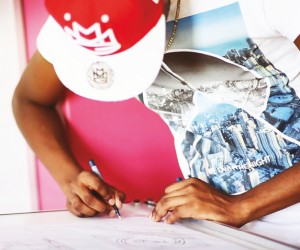Helen Bührs is the CEO and shareholder of Inscape Education Group, a leading tertiary education private provider specialising in the built environment and creative industries; the founder of Four44 Creative ecosystems, a space for earners and learners to play, work and train; the initiator of Project81 an empowerment platform for young designers, the founding member of Inscape Exchange, a non-profit organisation responsible for funding scholarships to academically deserving but financially challenged individuals, the name behind Thru the Chair and a wife and mother to four children.
She deals very well with ambiguity and open-ended solutions, implements and enforces structure on chaos, manages change by having a logical solution and planning for the unexpected, strives to do the right thing as objectively as possible, is extremely passionate and has a positive outlook and hope for the future. Helen shares her thoughts on some pertinent issues related to the higher education landscape in South Africa.
What are the challenges of being a private institution?
Challenges are relative and mostly dependent on how you as an organisation or individual view the presented landscape. Collaborating in the private education sector is exciting. Education in general is in the spotlight. We are in a time of flux. We, Education are being held accountable. We, Inscape love this. It makes our purpose so much more relevant. It is a time where the typical challenges of private sector, compliance, competition and sustainability are to be celebrated as an absolute minimum requirement. Our newest and most exciting challenge is gearing up to make the difference through education and maximizing our reach to ensure quality education becomes a reality for many more.
How important is the creative sector and industry at large for South Africa socially and economically?
Take a moment. Look up. Look left. Look right. In fact, spin around. Everything on you, around you and for you is designed. The hat on your head, the shoes on your feet, the system you currently find yourself in be it business, schooling, family or sport club. The event you are attending a little later, the screen you are reading, the paper you are feeling. Everything is designed. Whether you are considering the latest Tesla mobile or a new toothbrush. It is designed. Design is essentially a way of thinking. A methodology to provide solutions. Design encompasses functionality, aesthetics, longevity and relevance of a product, system or solution. Design thinking is for every board room. Design instils change. Design grows economies. Design is omnipresent.
What is your view on the importance of higher education and what are Inscape’s competitive advantages in terms of what you do in the sector?
In a recent article in the (Mercury: 12/01/2015), journalists Leanne Jansen and Anna Cox reveal universities are ‘bursting at their seams’, and that school-leavers have only one-in-eight chance of studying. The Mail & Guardian (24/01/2015) quoting the Minister of Higher Education’s submission to parliament, notes that in order to fund all new applications for higher education in South Africa, a budget of R51-billion was required. The higher education department’s budget, though, was in the region of R9.5-billion. The minister said the money would cover 425 095 new entrants and this would be 28 646 more than the last year.
There is clearly a deficit of suppliers in the South African Higher Education sector.
What is more important, however, is that those institutions who take up this challenge provide quality products and experiences to ensure positive change and growth for our people.
At Inscape, we provide progressive education that is closely monitored through intense quality assurance systems. Our high throughput and employment rates are a testimony to our success. Beyond the learning environment, we provide opportunities to our students that gives them a competitive advantage when entering the business world. As disruptive leaders in our sector, we aim to be nimble, agile, diverse and responsive to the immediate and future needs of our world. This is enabled through a technology driven strategy that is integrated in all that we do.
What do you see as the major challenges for education in SA, and what are the strengths of what we can offer local and international students?
The two greatest challenges for education in South Africa will be changing the embedded ‘Sheep mentality’ and secondly removing ‘excuses’ blocking broader access to education.
Educators that choose to avoid innovation, will continue herding their students through an exhausted system that wrongfully supresses an individual students uniqueness, and results in mediocre learning experiences.
Institutions, who do not address student accessibility linked to student support, required for students to achieve their full potential, will dwindle.
As a people, our country has a richness in culture coupled with rising ambition. Educators are being forced to operate outside of outmoded, daresay comfortable spaces. We must therefore embrace inevitable change and see challenges as opportunities. As responsible educators, Inscape offers a platform in which ambitious students from diverse cultures, can engage and benefit from this richness.






